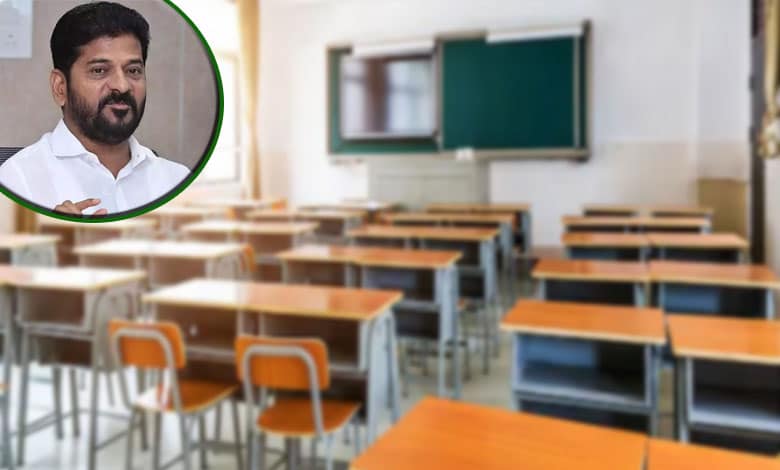Telangana: CM Revanth Instructs IAS and IPS Officers to Visit Schools
This directive, issued during the Children’s Day celebrations at LB Stadium, highlights the state government’s commitment to improving the standards of education and ensuring the welfare of students across Telangana.

Hyderabad: In a bold and progressive move aimed at transforming the educational landscape of Telangana, Chief Minister A. Revanth Reddy has directed all IAS (Indian Administrative Service) and IPS (Indian Police Service) officers to visit government schools regularly.
This directive, issued during the Children’s Day celebrations at LB Stadium, highlights the state government’s commitment to improving the standards of education and ensuring the welfare of students across Telangana.
Also Read: Congress Pushes for National Caste Census: Revanth Reddy Advocates for Expanded Reservations and Social Equity
The CM’s directive mandates bi-weekly visits by IAS and IPS officers to government schools in their respective districts, marking a significant shift in administrative involvement in the state’s educational framework. The new initiative aims to strengthen oversight, foster closer connections between the bureaucracy and schools, and ensure better monitoring of school facilities, resources, and the overall learning environment.
Table of Contents
Key Educational Initiatives by Telangana Government
During his speech at the Children’s Day event, CM Revanth Reddy highlighted several significant initiatives undertaken by the state government to uplift the education sector in Telangana:
- Increased Budget Allocation for Education:
Telangana’s government has committed over seven percent of the state’s annual budget to education. This increased funding is focused on enhancing the quality of education, improving school infrastructure, and addressing resource gaps. - Infrastructure Development:
As part of the government’s ongoing efforts to modernize public education, significant improvements have been made to the infrastructure of government schools. These upgrades include the provision of free textbooks, uniforms, and essential educational materials at the beginning of each academic year to ensure every student has access to basic resources. - Teacher Recruitment and Promotions:
Recognizing the importance of qualified teaching staff, the state government has successfully recruited over 11,000 teachers in just 65 days, filling long-standing vacancies in government schools. Additionally, the government has promoted 20,000 teachers and effectively managed the transfer of 35,000 others to address staffing needs across districts. - Support and Maintenance Staff:
CM Revanth Reddy also highlighted the government’s commitment to ensuring clean and well-maintained educational facilities. The state has allocated Rs 150 crore annually to support maintenance staff, including sanitation workers, sweepers, and other essential staff in government schools. Moreover, government schools are now provided with free power supply to reduce operational costs and ensure a more sustainable educational environment.
Holding IAS and IPS Officers Accountable for School Engagement
In a move to enhance accountability and ensure the effective implementation of these educational reforms, the Telangana Chief Minister has made it clear that failure by IAS and IPS officers to uphold their duties in supporting government schools will affect their career prospects, including promotions and transfers. This directive underscores the importance of active and hands-on involvement from administrative officers in the state’s education system.
The visits are designed to allow officers to directly interact with students, teachers, and school staff, gaining a firsthand understanding of the challenges faced by schools. These engagements will enable officers to address critical issues such as infrastructure needs, resource shortages, and overall educational quality, ensuring that policy and execution align closely.
Weekly Visits by District Collectors
To further ensure the successful implementation of these initiatives, the Chief Minister has instructed district collectors to conduct weekly visits to schools within their jurisdictions. These visits will focus on assessing the state of school facilities, ensuring proper resource allocation, and monitoring the quality of education provided to students. The collectors’ efforts will be pivotal in meeting the government’s objectives and ensuring that educational reforms are effectively carried out at the grassroots level.
Establishment of the State Education Commission
As part of its comprehensive approach to improving education, the Telangana government has also announced the creation of a State Education Commission. This commission, a pioneering initiative in India, will focus on addressing the issues faced by students, providing direct support, and enhancing the overall quality of education in government schools.
The State Education Commission is expected to play a critical role in streamlining educational policies, identifying systemic challenges, and creating a more student-friendly environment. By focusing on both the administrative and student needs, the commission will serve as a bridge between policy formation and practical execution, ensuring that education policies are aligned with the realities on the ground.
The Vision for Telangana’s Educational Future
Chief Minister Revanth Reddy’s initiatives are part of a broader vision to transform the education system in Telangana, ensuring that every student has access to high-quality education in a supportive, well-maintained environment. By involving administrative officers in the day-to-day workings of schools, the government aims to foster accountability, transparency, and collaboration between different levels of governance.
Also Read: Traffic Control Gets Inclusive: Hyderabad Empowers Transgender Community
With these robust initiatives, Telangana is positioning itself as a leader in education reform, creating a more equitable and inclusive educational landscape for all students, particularly those in government schools. As the state continues to invest in its educational infrastructure and resources, the future of education in Telangana looks bright, with an emphasis on accessibility, quality, and sustainability.
Conclusion: A New Era for Education in Telangana
The new directive for IAS and IPS officers to engage directly with schools is a significant step toward strengthening education in Telangana. By fostering closer ties between government officials and the educational system, the state is ensuring that its schools receive the attention, resources, and accountability they deserve. Combined with other key initiatives, such as increased budget allocation, teacher recruitment, and the establishment of a State Education Commission, these efforts are set to bring about lasting improvements in Telangana’s education sector.
This move marks the beginning of a new era for education in Telangana, where the focus is firmly on student welfare, infrastructure development, and the overall enhancement of the learning environment.
